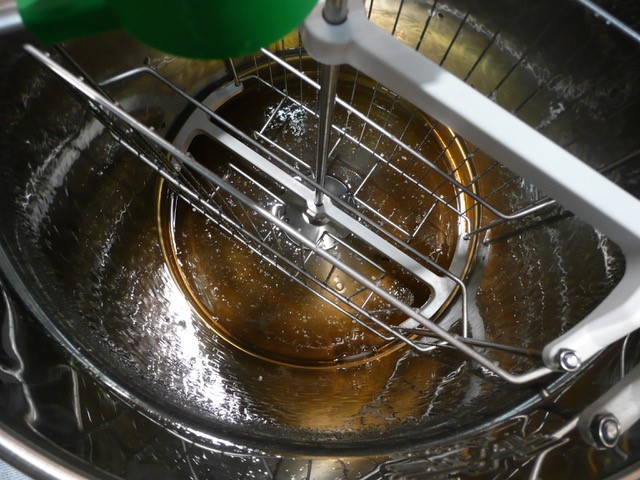Bee Blog October
Hello,
I am Gerald Bushby (pronounced bush bee!) a beekeeper in Weston on the Green, a small village in Oxfordshire. I am going to be writing a monthly blog about the bees in my apiary. I hope you will find it interesting. I should start by saying that I am not an expert, having only kept bees for three years. Anything I say is my own personal opinion; I accept that there may often be other views and opinions.
October and autumn has arrived. The changing colour of the leaves on the trees has been very noticeable this last week. Trees and plants seem to be more affected by the shortening length of daylight than the weather conditions, as it is still surprisingly warm. It is cold at nights but some recent day time temperatures have been unusually high, up in the 20 degs, and the bees are enjoying the end of the year with my two remaining hives being very active. A lot of pollen is being brought into the hives some of it a bright orangey yellow colour. At times the landing boards are extremely colourful with arriving bees looking like a bee football team returning home after a match in their brightly coloured kit (Wolverhampton Wanderers or Hull City??). They are also bringing in nectar which hopefully they will turn into honey to help sustain them through the winter months.
Last week I took off the last of the summer honey from the hives, a mere 2kg from Hive 1 and nothing from Hive 2. This make my total summer honey collection from both hives only 8kg, a very low yield. The BBKA carry out annual surveys of honey produced by British Beekeepers and over the last 5 years this has amounted to an average of 12kg per hive per year, a lower figure than one might imagine. This yield calculation is affected however by the fact that a large number of hives fail during the year, like my top bar hive did in July. If I look at my hives individually, however, Hive 2 has produced and exceptional 50kg (110 lbs) over the year and this from a three year old queen (the active life span of a queen is approximately three years). The spring production was unusually high and I suspect not likely to be repeated next year.
Last month I was wondering whether to leave a full super of honey on each hive for additional winter feed for the bees and had decided not to do so but to feed additional fondant if it was necessary. Given what I found in my last hive inspection and that the bees are making the most of the good weather now, I have changed my mind again. A compromise decision, I will leave a full super on Hive 2 but not on Hive 1 where I will feed with fondant if necessary.
To extract honey from a frame the Beekeeper will generally use some kind of device to spin out the honey using centrifugal force. I use a spinning cage contained in a stainless steel tank. My photograph this month is a view down into the tank having removed the empty frames showing the honey which collects at the bottom of the tank. What the photograph cannot convey is the glorious aroma of the freshly extracted honey. All hobbies have their aromas, the perspiration of the changing room, the moldy fetid air in a sailing boats hull. I can assure you that nothing can compare to the pleasure of inhaling the contents of the extractor, it is delightful.
If you would like to experience inhaling the contents of an extractor why not become a Beekeeper? Throughout the country each county has a beekeeping organization that runs courses each year, starting in the new year, to train new Beekeepers. They often also run “taster evenings” where they explain what is entailed before you commit to a course. County organisations can be contacted via the BBKA web site. This is the time of year to start looking. Ladies do not think that this is a male dominated pastime. On the contrary, at all of the courses and events that I have attended relating to beekeeping, more than 50% of those attending have been female.
I am a proud supporter of the ‘Bees for development’ charity, my love of the bee drew me to this wonderful UK based charity and the great work they do around the world with Bees and the impact they can have on people’s lives. Please help me support this wonderful organisation, as 2BScientific will be doing with donations to this hard-working charity.
Next time : The winter cluster
